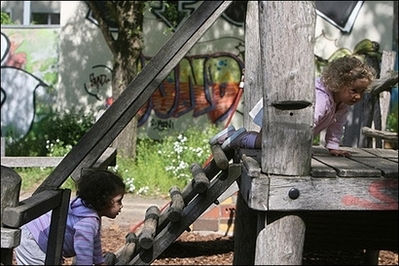A new study shows that parent training programmes fail to reduce behavioural problems in toddlers, suggesting that coaching on how to rear children may be a waste of time and money.
Toddlers play in a playground. A new study shows that parent training programmes fail to reduce behavioural problems in toddlers, suggesting that coaching on how to rear children may be a waste of time and money. [Agencies]
On average, behavioural problems afflict every seventh child aged 4 to 17, previously studies have shown.
Aggressive or extremely defiant youngsters are said to have externalised problems, while those of kids who withdraw, or suffer anxiety and depression, are described as internalised.
Troubles in childhood often have serious personal, social and economic consequences later in life, experts say.
Left untreated, approximately 50 percent of preschoolers with behaviour problems develop mental health problems, including depression.
Besides the direct cost of treatment, there are social costs as well: unemployment, family stress or violence, drug use and increased crime have all been linked to behavioural difficulties very early in life.
One approach is to deal with the problems as they emerge through counselling, drug treatment, or psychiatry. But this is expensive, and not always effective.
Another tack is to try to nip the problems in the bud by discouraging the kind of parenting that can lead to troubled behaviour, such as unduly harsh discipline and unrealistic expectations.
For the study, published in the British Medical Journal, researchers enrolled 300 mothers and their eight-month old tots in the Melbourne area into the training programme.
Unlike earlier studies, this one looked not just at high risk families, but a representative sampling of parents and children from poor, middle income and wealthier families.
The scientists, led by Harriet Hiscock at the Centre for Community Child Health in Parkville, Australia, compared behaviour of the test group over an 18 month period with another set of mothers and kids who did not receive any special counselling.
The results showed very little difference between the two groups.
Mothers in the programme were somewhat less abusive and acquired more realistic expectations of how quickly their children would progress.
But there was no significant difference is the level of behaviour problems in the children, or in the mental health of the mothers.
"The outcome at two years are insufficient to support widespread introduction of a very early universal programme to prevent behavioural problems in toddlers," the researchers conclude.
(Agencies via China Daily February 2, 2008)


